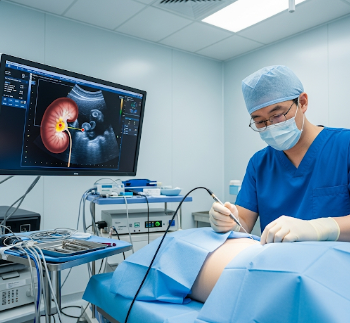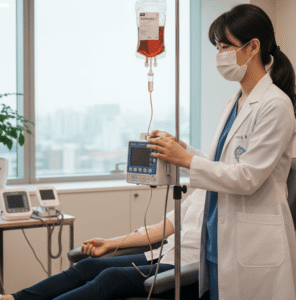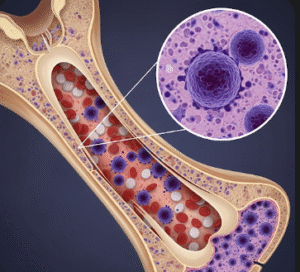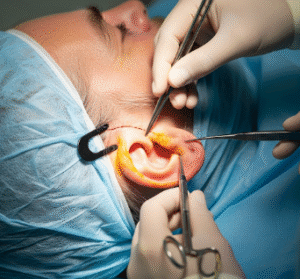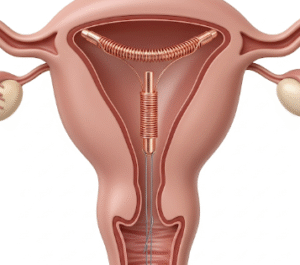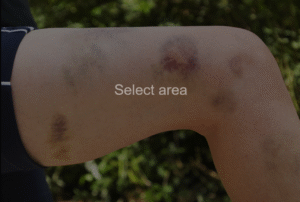Overview
Ablation for kidney cancer is a minimally invasive treatment that destroys cancerous tissue in the kidneys without removing the entire organ. This procedure is often recommended for patients who are not good candidates for surgery due to age, medical conditions, or small tumor size. Instead of removing the kidney, ablation targets and destroys the cancer cells directly using extreme heat or cold.
In Korea, ablation therapy has become a highly effective and safe alternative to traditional surgery, supported by cutting-edge technology, expert radiologists, and internationally recognized cancer care programs. Patients benefit from shorter hospital stays, less pain, and faster recovery compared to more invasive surgical procedures.
What is Ablation for Kidney Cancer?
Ablation is a treatment that uses either radiofrequency (heat) or cryotherapy (freezing) to destroy kidney tumors. It is especially effective for tumors smaller than 4 cm and for patients who cannot undergo major surgery such as partial or radical nephrectomy.
The two main types are:
- Radiofrequency Ablation (RFA): Uses high-frequency electrical currents to heat and destroy cancer cells.
- Cryoablation: Uses extreme cold gases to freeze and kill cancer cells.
Both methods are usually performed under imaging guidance (ultrasound, CT, or MRI) to ensure precision.
What are the Benefits?
✔️ Minimally invasive, requiring only small incisions or needle insertions.
✔️ Shorter recovery time compared to open or laparoscopic surgery.
✔️ Preserves healthy kidney tissue, reducing risk of kidney failure.
✔️ Lower complication rates, especially for high-risk patients.
✔️ In Korea, advanced imaging and robotics make the procedure even more accurate and safe.
Procedure Details
1) How should I prepare for Ablation for Kidney Cancer?
Preparation is essential to ensure the procedure goes smoothly:
- ➤ Medical evaluation with imaging scans (CT or MRI) to locate the tumor.
- ➤ Blood tests to check kidney function and overall health.
- ➤ Discussion with your doctor about stopping certain medications such as blood thinners.
- ➤ Fasting for 6–8 hours before the procedure.
- ➤ Arranging for someone to accompany you after treatment, since you may feel weak or drowsy.
In Korea, hospitals provide comprehensive pre-operative counseling, explaining the risks, benefits, and expected outcomes to help patients feel comfortable and informed.
2) What happens during the procedure Ablation for Kidney Cancer?
The procedure is usually performed under local anesthesia with sedation or general anesthesia, depending on the case. Steps include:
- ➤ The patient is positioned for best access to the kidney.
- ➤ Using real-time imaging guidance, a thin probe (needle-like device) is inserted into the tumor.
- ➤ For RFA: The probe emits radiofrequency energy, heating and destroying cancer cells.
- ➤ For Cryoablation: The probe releases extremely cold gases to freeze and kill the tumor.
- ➤ The procedure usually takes 1–3 hours, depending on tumor size and number.
Korean hospitals often use advanced robotic navigation systems to increase precision and reduce risks during probe placement.
3) What happens after an Ablation for Kidney Cancer?
After the procedure:
- ➤ Patients are monitored for a few hours in the recovery room.
- ➤ Most can go home the same day or within 24 hours.
- ➤ Some pain or soreness around the treatment area is normal and managed with medication.
- ➤ Patients are advised to avoid heavy activity for a few days.
- ➤ A follow-up imaging scan (CT or MRI) is scheduled within weeks to ensure the tumor is fully destroyed.
In Korea, patients benefit from intensive post-treatment monitoring and access to advanced imaging systems to track results and prevent recurrence.
Risks / Benefits
Risks may include:
- Mild bleeding or infection at the probe site.
- Injury to nearby structures such as the bowel or ureter.
- Rarely, incomplete destruction of the tumor requiring repeat ablation.
Benefits include:
- Less invasive than open surgery.
- Kidney preservation, reducing long-term complications.
- Quick recovery, often resuming normal activities within days.
- In Korea, patients gain access to world-class cancer centers with experienced specialists and the latest technology.
Recovery and Outlook
Most patients recover within a few days to a week after ablation. Swelling and discomfort are temporary, and normal activities can resume quickly.
✔️ Regular follow-up scans are crucial to ensure cancer does not return.
✔️ Long-term outlook is positive for patients with small, localized tumors.
✔️ In Korea, survival rates and treatment success are comparable to traditional surgery, but with reduced risks and faster recovery.
When To Call the Doctor
Contact your doctor immediately if you experience:
➤ Severe abdominal or flank pain unrelieved by medication.
➤ Fever or chills, which may indicate infection.
➤ Heavy bleeding in urine.
➤ Difficulty urinating or sudden drop in urine output.
➤ Signs of severe allergic reaction to anesthesia.
Best Korea Option / Process
Korea is at the forefront of minimally invasive cancer treatments, making it one of the best destinations for kidney cancer ablation. Patients can expect:
- Expert interventional radiologists and oncologists with global training.
- State-of-the-art imaging technology (CT, MRI, robotic guidance).
- Short hospital stays and specialized outpatient care.
- Comprehensive cancer programs, including targeted therapies if needed.
- Affordable costs compared to Western countries, with equally advanced care.
With Korea’s commitment to medical innovation and patient-centered care, ablation for kidney cancer offers patients an effective, safe, and less invasive alternative to surgery.

